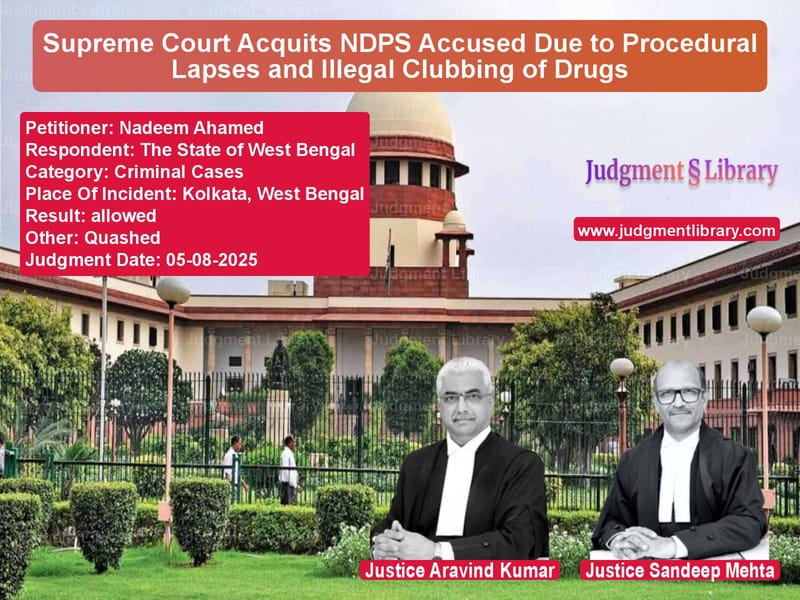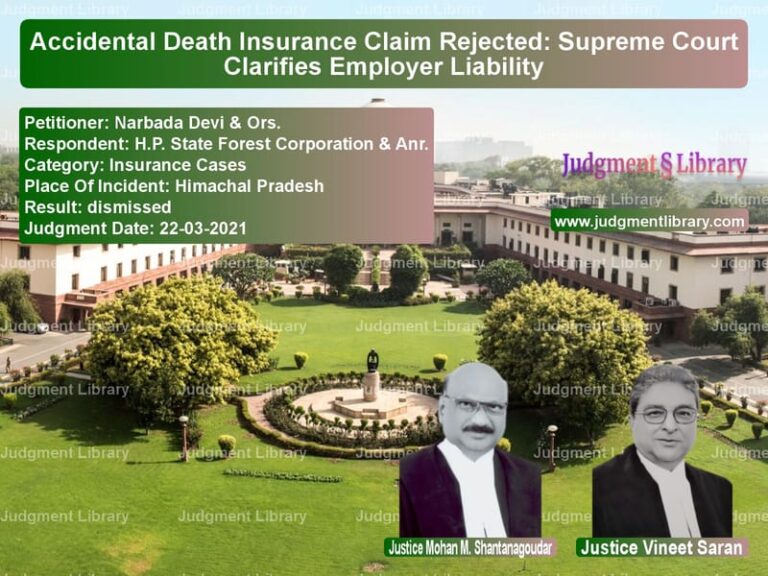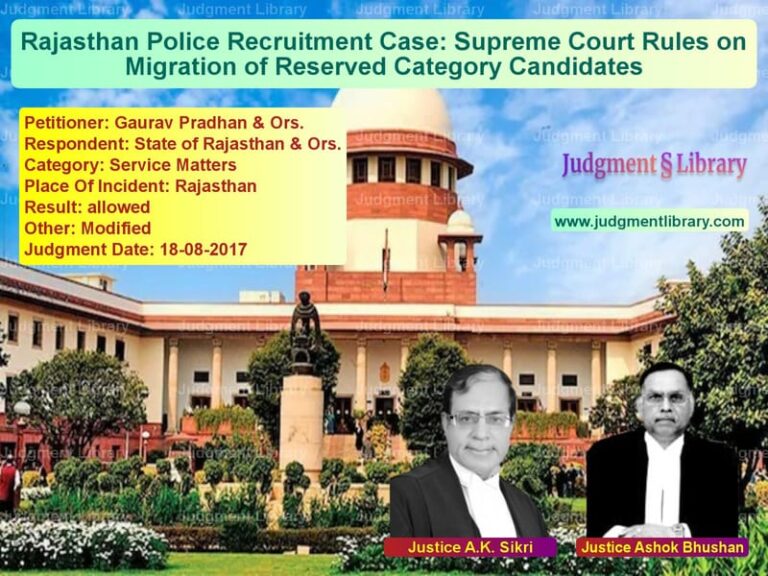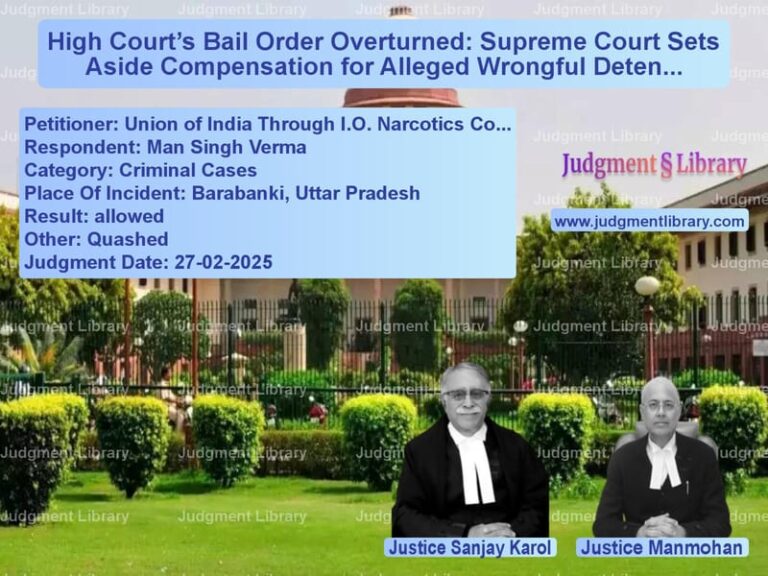Supreme Court Acquits NDPS Accused Due to Procedural Lapses and Illegal Clubbing of Drugs
In a significant judgment that underscores the importance of strict procedural compliance in narcotics cases, the Supreme Court of India has acquitted Nadeem Ahamed, who was serving a 10-year prison sentence under the Narcotic Drugs and Psychotropic Substances (NDPS) Act. The case, which originated from a 2018 drug seizure in Kolkata, highlights crucial legal principles about evidence collection, sampling procedures, and the fundamental distinction between suspicion and proof in criminal jurisprudence. The judgment delivered on August 5, 2025, serves as a stark reminder that even in cases involving serious drug offenses, the prosecution must strictly adhere to established legal procedures and cannot rely on mere assumptions or conjectures to secure convictions.
The Case Background and Initial Proceedings
The prosecution’s case began on July 16, 2018, when Subrata Saha, the seizure officer (PW-2), received information that two individuals would be supplying heroin in the Pragati Maidan police station area of Kolkata. Acting on this tip, a raiding team was formed, and around 8:00 PM, the team detained two individuals – Amit Dutta (co-accused) and Nadeem Ahamed (the appellant). The search proceedings were conducted in the presence of a Gazetted officer, Inspector Ananda Swarup Nayak (PW-4), after both accused exercised their right under Section 50 of the NDPS Act to be searched before a Gazetted officer.
During the search, the prosecution alleged that 125 grams of heroin was recovered from Nadeem Ahamed and 130 grams from Amit Dutta. The combined weight of 255 grams made it a commercial quantity case, attracting severe punishment under the NDPS Act. After testing positive for heroin, both accused were arrested and charged under Sections 21(c) and 29 of the NDPS Act. The trial court convicted both accused on August 24, 2021, sentencing them to 10 years of rigorous imprisonment and a fine of Rs. 1,00,000 each.
The High Court’s Controversial Decision
Nadeem Ahamed filed an appeal before the Calcutta High Court with a delay of 1183 days, citing financial crisis as the reason for the delay. However, the High Court refused to condone the delay and dismissed the appeal without examining the merits. This decision was particularly harsh considering the appellant was incarcerated and claimed financial hardship prevented him from filing the appeal in time. The Supreme Court strongly criticized this approach, noting that “the rejection of the appeal preferred by the accused-appellant by the High Court, simply on the ground of delay, was uncalled for.” The Court further observed that “Given the fact that the accused-appellant was incarcerated in prison from the date of his initial apprehension, the rejection of the appeal on the sole ground of delay was too harsh and unjustified in our opinion.”
The Supreme Court’s Groundbreaking Analysis
The Supreme Court, comprising Justices Aravind Kumar and Sandeep Mehta, decided to examine the case on merits rather than remanding it to the High Court, considering the appellant’s prolonged incarceration. The Court identified several fundamental flaws in the prosecution’s case that went to the root of the matter.
Illegal Clubbing of Contraband
One of the most significant legal errors identified by the Court was the trial court’s decision to club the contraband recovered from two separate individuals to reach the commercial quantity threshold. The Supreme Court emphatically stated that “Merely because the two accused, walking side-by-side, were apprehended simultaneously, and both were carrying narcotic drug concealed on their body, the said coincidental happening, by itself, would not give rise to an inference that either of them had the knowledge about the contraband being carried by the other.” The Court further clarified that “These facts may give rise to a suspicion, but suspicion, however, cannot take place of proof.”
The Court referenced its earlier judgment in Amarsingh Ramjibhai Barot v. State of Gujarat, where it had held that “there was no warrant for this conclusion at all as there is no evidence to suggest that there was any such abetment and/or criminal conspiracy within the meaning of Section 29 of the NDPS Act. The appellant and Danabhai Virabhai Rabari were found together, but individually carrying the recovered substances. Hence, it was not possible for the High Court to take the view that Section 29 was attracted.”
Procedural Lapses in Search and Seizure
The Supreme Court identified multiple serious procedural lapses that fundamentally undermined the prosecution’s case. The Court noted that the seizure officer collected only one sample each from the contraband packets, contrary to Clause 2.2 of Standing Order No. 1 of 1989, which mandates that “Samples from the narcotic drugs and psychotropic substances seized, shall be drawn on the spot of recovery, in duplicate, in the presence of search witnesses (Panchas) and the person from whose possession the drug is recovered.”
More significantly, the Court found that when the sample packets were opened during trial, they did not bear the signatures of the accused, despite claims that they had signed during the seizure. The Court meticulously examined the seizure officer’s testimony and noted that “A careful perusal of the above excerpt from the evidence of the seizure officer (PW-2) makes it clear that neither the mother packet, nor the sample packets, bore the signatures of the accused-appellant, when the same were opened and exhibited as material objects, during evidence of the aforesaid witness before the trial Court.”
Complete Non-Compliance with Section 52A
The Court found what it described as “a complete failure by the prosecution to comply with the important procedural requirement, as provided under sub-section (2) of Section 52A of the NDPS Act.” This provision requires that sampling and inventory preparation be done in the presence of a Magistrate. The Court noted that “there was no effort whatsoever, either by the seizure officer (PW-2), or the officer-in-charge, to undertake the procedure of sampling and inventory in presence of a Magistrate.”
The cumulative effect of these procedural lapses led the Court to conclude that “the entire procedure of seizure and sampling a total farce, and thereby, unworthy of credence.” Consequently, the Court held that the FSL report could not be relied upon as evidence.
The Legal Principles Reinforced
This judgment reinforces several crucial legal principles in NDPS cases. First, it establishes that mere proximity between accused persons does not automatically establish conspiracy. The prosecution must provide positive evidence of prior agreement and knowledge. Second, it underscores that procedural compliance is not merely technical but goes to the root of the evidence’s reliability. Third, it emphasizes that appellate courts should be liberal in condoning delays when the appellant is incarcerated and claims financial hardship.
The Court’s approach balanced the strict provisions of the NDPS Act with fundamental principles of criminal jurisprudence, noting that while the NDPS Act contains stringent provisions, these cannot override basic procedural safeguards and the presumption of innocence.
The Final Outcome and Its Implications
The Supreme Court allowed the appeals, acquitted Nadeem Ahamed of all charges, and directed his immediate release from custody. The Court quashed and set aside both the High Court’s order and the trial court’s conviction.
This judgment serves as an important precedent for several aspects of NDPS jurisprudence: the requirement of strict procedural compliance, the improper clubbing of contraband from separate accused without evidence of conspiracy, and the approach courts should take when dealing with delayed appeals from incarcerated individuals. It reinforces that while drug offenses are serious, the pursuit of justice must always adhere to established legal procedures and evidentiary standards.
The case also highlights the Supreme Court’s role as the ultimate guardian of constitutional rights, ensuring that even in cases involving serious allegations, individual rights and procedural fairness are not sacrificed at the altar of convenience or expediency. The judgment demonstrates that in the Indian criminal justice system, the means are as important as the ends, and justice must not only be done but must be seen to be done through proper legal procedures.
Petitioner Name: Nadeem Ahamed.Respondent Name: The State of West Bengal.Judgment By: Justice Aravind Kumar, Justice Sandeep Mehta.Place Of Incident: Kolkata, West Bengal.Judgment Date: 05-08-2025.Result: allowed.
Don’t miss out on the full details! Download the complete judgment in PDF format below and gain valuable insights instantly!
Download Judgment: nadeem-ahamed-vs-the-state-of-west-be-supreme-court-of-india-judgment-dated-05-08-2025.pdf
Directly Download Judgment: Directly download this Judgment
See all petitions in Drug Possession Cases
See all petitions in Fraud and Forgery
See all petitions in Bail and Anticipatory Bail
See all petitions in Custodial Deaths and Police Misconduct
See all petitions in Judgment by Aravind Kumar
See all petitions in Judgment by Sandeep Mehta
See all petitions in allowed
See all petitions in Quashed
See all petitions in supreme court of India judgments August 2025
See all petitions in 2025 judgments
See all posts in Criminal Cases Category
See all allowed petitions in Criminal Cases Category
See all Dismissed petitions in Criminal Cases Category
See all partially allowed petitions in Criminal Cases Category







